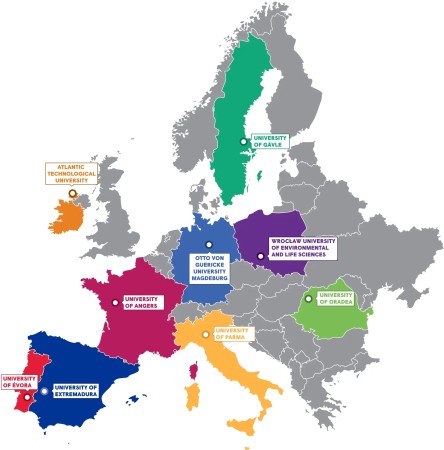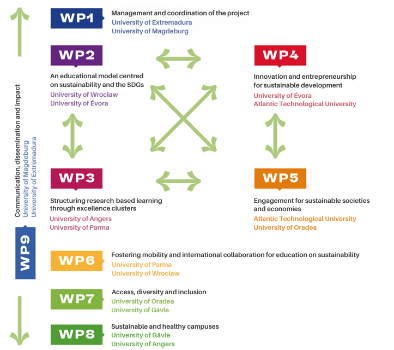
EU GREEN European alliance
The University of Angers (UA) has joined forces with 8 other European higher education institutions to form the European universities alliance EU GREEN. This strategic partnership aims to strengthen cooperation between the 9 partner universities by integrating sustainability at the core of our education, research, innovation and campus life missions.
 This consortium, launched in response to the Sustainable Development Goals (SDGs) of the United Nations, is based on the conviction that universities have an essential role to play in the ecological transition. The name of our alliance, “European Universities alliance for sustainability: responsible GRowth, inclusive Education and ENvironment”, reflects our desire to build a more equitable society and a more sustainable future.
This consortium, launched in response to the Sustainable Development Goals (SDGs) of the United Nations, is based on the conviction that universities have an essential role to play in the ecological transition. The name of our alliance, “European Universities alliance for sustainability: responsible GRowth, inclusive Education and ENvironment”, reflects our desire to build a more equitable society and a more sustainable future.
In 2022, the EU GREEN alliance was awarded the “European universities” call of the Erasmus+ programme, securing €14.4 million in funding from the European Commission. At the local level, this funding was supplemented with support from the French National Agency for Research (ANR), the Pays de la Loire Region and the Angers Loire Métropole urban community.
At the local level, this funding was supplemented with support from the French National Agency for Research (ANR), the Pays de la Loire Region and the Angers Loire Métropole urban community.
The partner universities
The EU GREEN alliance is comprised of the following 9 partner universities from across Europe:
- The University of Angers, France
- The University of Extremadura, Spain, which coordinates the project
- The Atlantic Technological University, Ireland
- The University of Évora, Portugal
- The University of Gävle, Sweden
- The University of Magdeburg, Germany
- The University of Oradea, Romania
- The University of Parma, Italy
- The Wrocław University of Environmental and Life Sciences, Poland
These universities joined forces because of the common characteristics they share:
- They are all medium-sized universities located in rural areas away from Europe's major cities
- They are all recognised for excellence in academic teaching, multidisciplinary training and support for research
- They play a major local role, contributing to local influence
- They are strongly committed to sustainability and social responsibility
Opportunities for all members of the university community
The EU GREEN alliance offers a wide range of academic and professional opportunities for the entire university community (students, doctoral students, professors, researchers and administrative staff):
- Academic opportunities: offering study programmes, training courses and degrees related to sustainability and social responsibility
- Mobility and exchanges: facilitating student and staff mobility between partner universities
- Promoting cooperation in innovation and research
- Moving towards healthier and more sustainable campuses
- Ensuring inclusion and equality through equal access to alliance opportunities for all
- Strengthening European cooperation and professional development in the field of sustainability
The scope of the alliance’s activities
The partner universities are working together on nine “work packages” (WPs) to achieve the EU GREEN objectives.
Each university is an active member of all the Work Packages, which are interlinked in terms of their missions and objectives. More specifically, each university leads one group and co-leads another. UA is the lead for the research work package (WP3) and the co-lead for the one on healthy and sustainable campuses (WP8).
- Overall management and coordination of the project (WP1)
- Sustainability-oriented education (WP2): Developing common curricula, training courses and degrees that integrate sustainability principles for students and . UA coordinators: Albéric Baumard and Erwan Autret.
- Research-based learning (WP3, led by UA): Fostering research collaboration between partner universities around six key themes closely linked to the SDGs. For more information on WP3: www.wp3eugreen.univ-angers.fr. UA coordinators: Claire Manceau and Alix Blouët.
- Innovation and entrepreneurship for sustainability (WP4): Encouraging innovation and student entrepreneurship with innovative solutions to current environmental challenges while promoting economic and social sustainability. UA coordinator: Chloé Maillet.
- Engagement for sustainable societies and economies (WP5): Promoting commitment to sustainable societies and economies by raising citizens' awareness of the SDGs, while fostering collaboration with local partners. UA coordinators: Albertine Lucas and Laurent Bordet.
- Mobility and international collaboration for education on sustainability (WP6): Facilitating student and staff mobility to enrich academic pathways and strengthen collaboration for sustainability education. UA coordinator: Sonja Civardi.
- Access, diversity and inclusion (WP7): Ensuring that the entire university community has access to all of the opportunities offered by EU GREEN, by implementing initiatives to promote diversity and inclusion on campuses. UA coordinator: Manon Guyard.
- Sustainable and healthy campuses (WP8, co-piloted by UA): Encouraging the transition to healthy and sustainable campuses through awareness-raising actions and sports or innovative events, with a view to enhancing the well-being of the community. UA coordinators: Françoise Hocquet and Charlène David.
- Communication, dissemination and impact of the alliance initiatives (WP9): includes the creation of a digital infrastructure to facilitate the exchange of information between partners. UA communication coordinators: Delphine Boisdron and Pauline Pacheco / UA infrastructure coordinator: Pierre Saulue.
- Overall management and coordination of the project (WP1)
Concrete initiatives on campuses
Since its creation, the EU GREEN alliance has already enabled the implementation of several concrete initiatives that have benefited our entire university community. Many more are in the pipeline. Some of the actions already made possible include:
- Mobility with Blended Intensive Programmes (or BIPs): Students, teachers and administrative staff can sign up for these hybrid mobility programmes, combining a period of distance learning and a short period of mobility abroad at one of the alliance's partner universities.
- Seed funding for research: In 2024, 10 research projects, 8 of which involved UA researchers, have received alliance funding totaling €299,745.
- “Get active” sports challenge: In April 2024, 2,882 students and staff from partner universities took part in this sports challenge designed to promote physical activity and combat sedentary lifestyles.
- Mobility of researchers: The Researcher Mobility Programme funding scheme facilitates the mobility of researchers from partner universities, with the aim of developing research collaborations.
- Co-supervision of theses: 8 theses funded by EU Green are currently being co-supervised by teachers or researchers from different partner universities.
- Entrepreneurial programme for students: A programme on sustainable entrepreneurship has been made available to students in the alliance, inviting them to consider innovative solutions to societal challenges.
- Webinars on sustainability: A series of webinars on topics related to sustainability and social responsibility are held throughout the year.
- Mobility with Blended Intensive Programmes (or BIPs): Students, teachers and administrative staff can sign up for these hybrid mobility programmes, combining a period of distance learning and a short period of mobility abroad at one of the alliance's partner universities.
The alliance’s bodies and councils
Within EU GREEN, several boards and councils are responsible for the governance of the alliance and the coordination of its activities:
- The Board of Rectors: Made up of the rectors or presidents of the partner universities, it defines the alliance's strategic direction and ensures its supervision. At UA: Françoise Grolleau.
- The Senate: It guides the alliance's strategic orientations in the fields of education, research and internationalization, and validates and supports the work of the Executive Committee. It is made up of representatives from each partner university, representatives from the Student Council, and representatives from the associate partners. At UA: Catherine Passirani, Isabelle Mathieu, Sandra Camus, David Canevet and Erwan Autret.
- The Executive Committee: Made up of academic and administrative representatives from the partner universities, it coordinates the alliance's projects in line with the strategic objectives fixed. At UA: Françoise Hocquet and Claire Manceau.
- Joint Education Committee: This committee, made up of the Vice Presidents for Education of each university, is responsible for harmonising educational programmes and developing joint degrees within the alliance. At UA: Isabelle Mathieu and Erwan Autret.
- Joint Research Committee: A committee made up of the Vice Presidents for Research of each university, dedicated to the development of and coordination of research activities in the different key themes. At UA: Sandra Camus and David Canevet.
- PhD Council: Made up of representatives from the doctoral schools of the nine partner universities, it supports the interests of doctoral students at the alliance level and takes part in its research-related initiatives and projects. At UA: Nicolas Clere and Nathalie Leduc.
- Student Council: This council is made up of student representatives from the nine partner universities. It represents the interests of students at the alliance level and plays an active role in its initiatives and projects. At UA: Ilyas Barbaud, Lilas Roux-Sauvegrain, Rayan Ben Mohamed, Aurélien Valentin and Thibaut Jouy.
- The Board of Rectors: Made up of the rectors or presidents of the partner universities, it defines the alliance's strategic direction and ensures its supervision. At UA: Françoise Grolleau.
European universities alliances: The initiative to create European universities alliances was proposed by the European Union in 2017, with the aim of improving higher education in Europe. Since 2019, 50 such alliances have been established, bringing together 430 European institutions (including 50 in France) and 7 million students. These alliances promote pedagogical innovation, student mobility, multilingualism, interdisciplinary studies and responses to major societal challenges.
A few figures about EU GREEN:
9 partners universities
More than 158,000 students
More than 18,000 staff
Contact
A dedicated team at UA can answer your questions : eu-green @ univ-angers.fr


